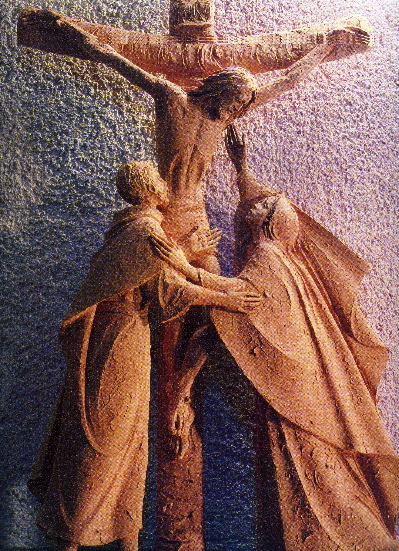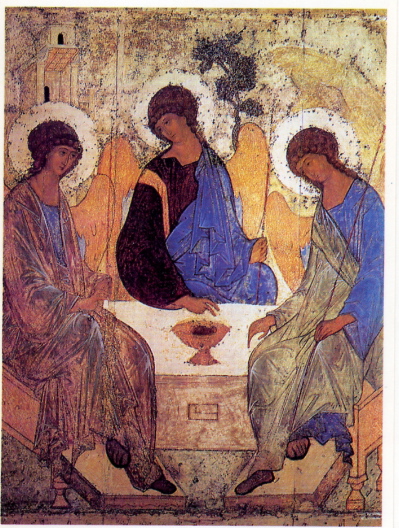John of the Cross
6. Iain Matthew: Prayer

19. Prayer: Should we? Can we? (pages 134-141)
Iain Matthew writes:
‘Something is taking place, and it is important to be part of it.
That is the intuition which John of the Cross has been communicating.
It comes across in the whole pattern he has traced –
an approaching God who gives where he finds space,
and who works in darkness to create that space.
It is there when the pattern concentrates into the here and now –
faith, hope, love, and our Yes to God’s gift of himself.
• Now the happening has received the name “Jesus” –
who has searched out the darkness and is himself the gift.
This is taking place. And it is important to be part of it.
For John, becoming part of it is prayer.’
Ask God … suspending one’s life upon belief in God’s involvement.’
‘Our incompleteness is our dignity,
and when we feel it we are most truly ourselves.
When we utter our appeal from there, we are being mature,
being what we are meant to be.
For the human person, then, prayer is a supreme value.’
‘Look at my Son … he is my total reply’(John of the Cross II Ascent 22.5).
‘John’s focus is not on asking for things, but on being with God.’
‘Enter within your heart,
and work in the presence of your bridegroom,
who is always present loving you’(John of the Cross Sayings 89).
‘God’s gaze is his love, and his love does things.
God’s gaze works four blessings in the soul:
it cleanses her, makes her beautiful, enriches and enlightens her.’
‘Is prayer possible now for me? Here is John’s contribution.
Christ’s loving gaze is constantly upon us,
and he makes it possible.’
20. Prayer, a ‘Being with’ (pages 142-154)
Iain Matthew writes:
Method: ‘The first thing is to summon up the mysteries of Jesus
by imagining them.
Then ponder in your mind the mystery you have evoked.
Third, attentiveness to God in loving stillness:
this is where the fruit of the other activities is plucked,
and where the door of the mind is opened to God’s light.’
‘The outpoured Spirit, fruit of the Risen Christ,
claims prayer as God’s enterprise.’
‘Prayer is very good, if, by believing and loving,
we are attending to the Other Person.’
When God circumvents our radar,
the instruments we once employed to connect with him
are going to feel redundant,
and his deeper presence will go unnoticed
until we adjust our expectations.
The temptation is to keep fiddling with the control panel.
A better alternative, John suggests, is to surrender.
Surrender and be content to be with the One
who is content to be with us.’
Not every darkness is blessed, but it can be turned into a blessing.
‘I can’t pray as I used to. I do not want an alternative. I want God.’
‘Whatever the darkness comes from
(lukewarmness, indisposition, contemplative growth),
John’s witness confirms that now, for me, in my weakness,
prayer is possible:
possible, because God never ceases to press in upon my spirit;
possible, because Christ has not stopped welcoming the weak;
possible, because I can decided now, again, to be with him,
to want to be with him.’
‘To become recollected means owning my truth
(this is how I am feeling)
and affirming a love for the Christ who is seeking me even in that.
Affirming “I want you. I want to want you”.’
‘John’s story began here,
with his need for the One who had “wounded” him.
There he found Christ, poor enough to share the wound,
risen enough to heal it.
Out of that he confidently proposes prayer to us,
not as an escape from the darkness that lies beyond our threshold,
but as a journey into it.
Prayer renames that darkness, not chaos, but the inner cavern,
the space within the heart of the Risen Christ.’
John of the Cross writes:
‘You should not bear being attached to anything,
whether it be to the practise of meditation,
or to anything, whether sensory or spiritual,
which delights you, or any way of thinking.
You should be very free regarding everything,
because any thought or discursive reflection
or satisfaction upon which you may want to lean
would impede and disquiet you,
and make noise in the profound silence
of your senses and spirit,
which you possess for the sake of this
deep and delicate listening.’(Living Flame 3.34).

Jesus gives us his heart: '‘I have revealed you to them and will continue to do so, so that the love with which you loved me may be in them, and so that I may be in them’(John 17:26).

‘I am in the Father and you are in me and I in you’(John 14:20).
‘I pray that they will be one as we are one, with me in them and you in me’(John 17:21).
‘I have come to bring fire to the earth, and how I wish it were blazing already’(Luke 12:49).

A Praying heart: Yielding to love (Click HERE and scroll down for Book with that title)

John of the Cross writes (Spiritual Canticle 1.7):
‘The soul is God’s most beautiful creation.
So then, soul, so anxious to know
the whereabouts of the One you love
so that you may seek Him and be united to Him,
know that you yourself are His dwelling place,
his secret chamber,
the place where he lies hidden.
Rejoice and be glad, for all you ever wanted,
all you ever hoped for, is so close
as to be within you.
You cannot be without Him.’
In his commentary on the Spiritual Canticle29,3 he writes:
‘Let those, then, who are singularly active,
who think they can win the world
with their preaching and exterior works,
observe here that they would profit the Church
and please God much more,
not to mention the good example they would give,
were they to spend at least half of this time with God in prayer,
even though they may not have reached a prayer as sublime as this.
They would then certainly accomplish more,
and with less labour, by one work
than they otherwise would by a thousand.
For through their prayer they would merit this result,
and themselves be spiritually strengthened.
Without prayer they would do a great deal of hammering
but accomplish little, and sometimes nothing,
and even at times cause harm.’
